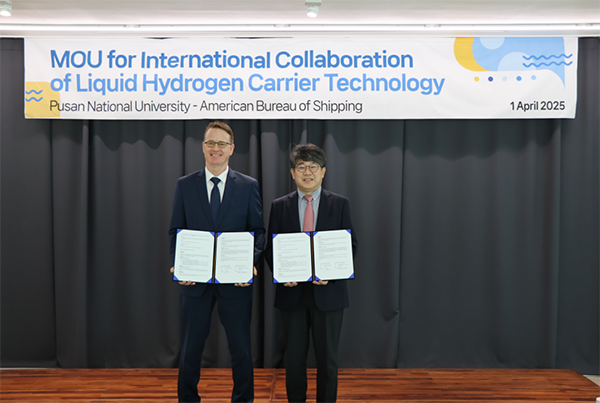ABS and Pusan National University Spearhead Liquid Hydrogen Carrier Technology
Key Ideas
- ABS and Pusan National University signed an MoU to jointly research and develop liquid hydrogen carriers and propulsion systems.
- The collaboration aims to tackle the technical challenges of mass transporting liquefied hydrogen stored at -253°C.
- Pusan National University leads in developing the world’s largest liquefied hydrogen carrier under a South Korean government initiative.
- South Korea aims to build a demonstrative liquefied hydrogen carrier by 2027 to secure a competitive edge in the shipbuilding industry.
ABS and South Korea’s Pusan National University have entered into a memorandum of understanding (MoU) to collaborate on the research and development of liquid hydrogen carriers and cryogenic engineering. The partnership with Pusan National University’s Hydrogen Ship Technology Center aims to advance the application of hydrogen technology at sea, particularly in the challenging realm of mass transporting liquefied hydrogen stored at ultra-low temperatures. This groundbreaking cooperation between ABS and the university signifies a pivotal step towards the commercialization of liquid hydrogen carriers.
The Hydrogen Ship Technology Center at Pusan National University has been assigned a significant role as the leading institution in the 'Development of Basic Technology for Commercialization of Liquid Hydrogen Carriers' project. This project is part of the broader 'K-Shipbuilding Super Gap Vision 2040' initiative, which involves a substantial investment to drive innovation in shipbuilding, including projects like ammonia-fueled ships, liquid hydrogen carriers, and more.
The collaboration between ABS and Pusan National University is viewed positively by both parties. ABS Senior Vice President and Chief Technology Officer, Patrick Ryan, expressed optimism about the partnership's potential to revolutionize the use of hydrogen technology in maritime operations. Similarly, Director Lee Jae-Myung of the Hydrogen Ship Technology Center highlighted the importance of this collaboration in advancing the future hydrogen economy and leveraging cutting-edge technology.
South Korea's strategic move to build a demonstrative liquefied hydrogen carrier by 2027 underscores its commitment to staying ahead in the shipbuilding industry. By investing in advanced technologies like liquid hydrogen carriers, South Korea aims to secure a competitive advantage and drive the evolution of sustainable maritime solutions.
